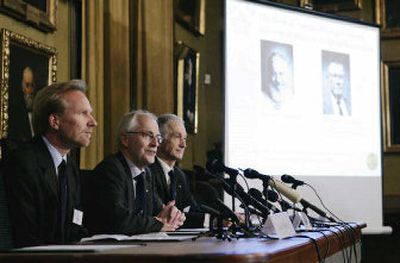Game theory lands Nobel

STOCKHOLM, Sweden – Underestimating your opponent’s hand in a game of poker could dig a deep hole in your pocket.
Making the same mistake in international politics could spark a world war.
The comparison may seem far-fetched, but two researchers won the Nobel Memorial Prize in Economic Sciences for using so-called game theory to explain major political and economic conflicts.
Israeli-American Robert J. Aumann and American Thomas C. Schelling share the prestigious 10 million kronor ($1.3 million) award that was announced Monday by the Royal Swedish Academy of Sciences.
The same theory was highlighted in the 1994 economics prize that brought fame to John Nash, portrayed by Russell Crowe in the Hollywood blockbuster “A Beautiful Mind.” It is a branch of applied mathematics that uses models to study interactions between countries, businesses or even regular people.
Game theory can be used to explain how actors make decisions by sizing up their opponents and anticipating their moves, while projecting an image of their own power, much like the Americans and Soviets did in the nuclear arms race of the Cold War.
“I use game theory to help myself understand conflict situations and opportunities,” said Schelling, 84, who teaches at the University of Maryland.
He used game theory in his 1960 book “The Strategy of Conflict” to focus on how the U.S. and the former Soviet Union maintained credible threats that were not likely to be used, given the threat of nuclear annihilation.
Aumann, 75, a professor at the Center for Rationality at the Hebrew University of Jerusalem, applied game theory to economics.
His research helps explain why cooperation is more difficult when there are many participants and when they interact infrequently, the academy said in its citation.
Prize committee member Carl-Gustaf Lofgren said game theory is helpful in understanding how illegal price cartels are formed – and thereby helps regulators break them up.
It is also a common tool to analyze everything from territorial disputes between countries to racial segregation in neighborhoods.
One of Schelling’s key contributions to game theory is his analysis of so-called “strategic commitment,” which is a way for one side to strengthen its position by deliberately worsening its range of options.
If one side commits itself to a course of action, its threats become more credible, Lofgren said.